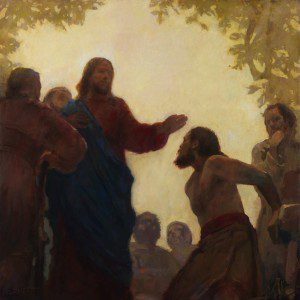I was bitter. I felt cheated. I was finding reasons to justify myself and cling to the victim’s role. I found myself wanting to soak my soul in self-pity and swaddle myself in depression. I managed misery for a few days. But then I needed to do my temple shift. I can’t take such feelings into the temple. They simply won’t fit.
At one point during my temple service, I was contemplating some words from Exodus 40:
And thou shalt bring Aaron and his sons unto the door of the tabernacle of the congregation and wash them with water. And thou shalt put upon Aaron the holy garments and anoint him and sanctify him.
I thought about Aaron, and wondered when this event preparing him for priestly ministration happened. Was it before or after the golden calf incident?
As it turns out, it happened both before and after. In Exodus 28, we read:
1 And take thou unto thee Aaron thy brother, and his sons with him, from among the children of Israel, that he may minister unto me in the priest’s office
3 And thou shalt speak unto all that are wise hearted, whom I have filled with the spirit of wisdom, that they may make Aaron’s garments to consecrate him, that he may minister unto me in the priest’s office.
41 And thou shalt put them upon Aaron thy brother, and his sons with him; and shalt anoint them, and consecrate them, and sanctify them, that they may minister unto me in the priest’s office.
In this chapter, the children of Israel have already been commanded to bring their gold and precious metals to build a sanctuary. They become impatient, however, as Moses lingers on Mount Sinai, and then they insist on the easily accessible (because it can be created) Egyptian idol rather than the vague ideal of whatever the absent Moses has promised. They go through a process of bringing their gold to Aaron—but now it is to the false “sanctuary”. They are horribly punished when Moses returns.
Aaron, in chapter 28, had been instructed to wear a gold plate upon his forehead as a symbol that he will make atonement for the Israelites. Moses, however, goes beyond the symbol. He says to those who, upon Aaron’s command, have made themselves naked before “the enemy”: Ye have sinned a great sin: and now I will go up unto the Lord; peradventure I shall make an atonement for your sin.” (Exodus 32:30) When Moses approaches God, he asks that his people be forgiven and then says, “Oh, this people have sinned a great sin. . . Yet now, if thou wilt forgive their sin—and if not, blot me, I pray thee, out of thy book which thou hast written.” Further, he refers to the sins of the people as “OUR” iniquity and “OUR” sin (29:9). Though he was not only absent but in God’s presence when the people sinned, Moses includes himself in the communal iniquity.
One of my guiding mandates is from The Brothers Karamazov, wherein Father Zossima, in various words and places, says essentially, “All are responsible for all, and I more than any.” In other words, any individual action may ultimately be traced to a communal catalyst, and that each of us must examine what part we played in creating an environment where horrors—or miracles–happen.
I am currently working on a film, Heart of Africa, which takes place in the Democratic Republic of Congo. The place may seem beyond the reach of anyone reading this. And yet, your cell phone likely includes metals mined in the Congo. Chinese might have put the components together, but you likely connect yourself to the world by using elements from the Congo. Do you bear any responsibility for how these metals are mined and by whom? Are you in part responsible for a child’s disease, since that child has spent much of his life mining metals you use?
To get much more personal, as I have read angry letters from someone (or many someones) who feel[s] that I betrayed her in one way or another, my inclination is to defend myself and return lash for lash. We see this in blog comments all the time. Someone will take several hours out of their day to do a point-by-point rebuttal of a blog post. The original post’s writer will then take several hours out of their day to respond with point-by-point rebuttals. Neither will be satisfied, and eventually, most people on the thread will be more persuaded of their initial viewpoint—and angry that others weren’t understanding it. In fiery exchanges, most readers/commenters are looking for vulnerable spots in an argument where they can correct and often accuse. Such is not of God. Such is not the behavior I want to exhibit.
I wish I didn’t have personal experience to draw on. However, I have engaged in such reprehensible behavior myself. I know where it has led me, and the spirit I have felt while refuting someone else’s claims is not one I wish to keep.
As I read about Aaron and his sons being given a second chance to prove themselves, I wonder what process of repentance Aaron went through. It is not mentioned. Moses, however, offers himself as a substitute for his brother and those who have returned their foolish hearts to Egypt. He takes the Father Zossima position that the sins of the people are communal, even though some (and Moses in particular) could well claim exemption.
I have spoken before about my “prayer upon opening the internet”. I want to address more common communication now.
At some point, and probably at several, we will be accused by someone we love of bad behavior. Our tendency will be to defend ourselves. In rare cases, we will be heard, but usually the other person (and this happens always if there’s an angry spirit present) will enter the point-by-point. A marriage or a friendship can be lost in such an argument.
I like the meme going around Facebook which says, “Before you speak, consider the following: Is it true? Is it necessary? Is it kind?”
Before we answer either an argument or an accusation, we might want to reflect on these questions as well:
Do I accept this person as my eternal brother or sister? Consider that Joseph of the Old Testament chose not to reveal himself to his brothers until Judah offered himself as his Benjamin’s proxy (“Now therefore, I pray thee, let thy servant abide instead of the lad a bondman to my lord; and let the lad go up with his brethren” (Gen. 44:33). In this offer, Judah showed that he understood the depth of his brotherhood. Immediately afterwards, Joseph wept and revealed that he too was a brother to all of these seeming beggars. As we prove our concern for our fellow beings, the Lord (whom Joseph foreshadows in many ways) will also reveal Himself to us.
Do I understand EVERYTHING behind this person’s accusation—including how it could be true, how events in this person’s life might have influenced their perception, or how something as small as my tone could have felt insulting?
Do I recognize the spiritual risk it is to pursue an argument? Candor is a poor substitute for charity. In the name of candor, which we might preface with a statement that we pride ourselves in “telling it like it is”, we can offend and ignite a flame of anger, when the other’s real need is a balm of healing.
Do I understand the consequences of my rudeness (even if I call it candor)? Shylock comes to mind, not in his pitiful but manipulative description of himself as subject to all the vulnerabilities of mortality, but in his vow to learn the lessons of abuse from his abusers and to “better the instruction.” He proclaims, “The villainy you teach me I will execute, and it shall go hard.” In Shakespeare’s play, Shylock is defeated, but have we not seen his model for revenge enacted throughout history?
In our most vulnerable moments, all of us want to explain how badly we have been hurt. As parents, we often do it at the very moment when our children most need us to open our ears and hearts and say, “Forgive me for not listening to you better. Help me understand.” And then (the hardest part), we shut up and listen.
As I reflect on those chapters in Exodus where the Israelites begin again to build the holy sanctuary, I see the repeated phrases “willing heart” and “wise heart.”
I ask myself if my heart is willing and wise or if my own desires for vindication are trumping my inclinations towards charity. Is my heart stubborn? Unyielding? Foolish? What is written in its tablets? My own name and wants, or others’ names (including God’s)?
We are all engaged in some kind of construction, whether we’re building a holy or an unholy temple. Each relationship builds the next. We bring peace and good will–or their opposites–with us to every encounter. With peace comes clarity and even revelation, and every good thing which Aaron and his sons were promised in their anointing.
I present myself here as a struggling pilgrim, having contributed some gold to an idol celebrating my own selfish instincts, but with greater commitment today to dedicate myself to holier purposes.
(Also, feel free to examine Heart of Africa. We will be launching a Kickstarter campaign soon.)













